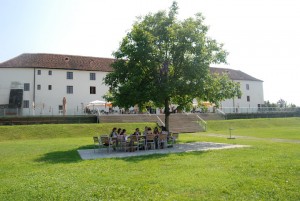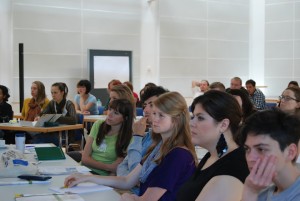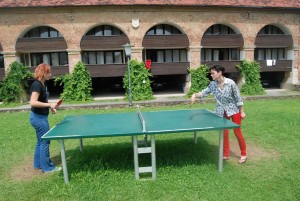During July 2012 Victoria Satchwell attended the Graz University Summer School, here is her story.
Pre- departure: Vicky’s travel tips
All correspondence with Graz University prior to arrival was friendly and easy to follow. In general the organizing team are efficient and helpful. I received quite a bit of reading material to sift through before arrival – this was a tall order as I was still writing exams but it was a welcome indication that the summer school has a healthy focus on academics.
Having heard about the passport/visa/ticket nightmares of others, my experience of getting there was reasonably painless (despite the fact that Seggau is in the middle of nowhere). Having a European passport thankfully obviated the visa palaver. I booked all my train and plane tickets online. I recommend kayak.com to book flights. The site provides comparisons between various airlines eliminating the need to shop around. A credit card is however required in order to book with this site. Book flights as soon as possible in order to keep costs down. For trains within Austria go to oebb.at/en/. If you book far enough in advance – about 4 days – you may come across substantially cheaper tickets. A green four leaf clover indicates these discounted rates – I found a ticket that usually costs €37 for €9. When booking connections (off a train onto a plane) be careful to leave yourself sufficient transfer time get from station to airport. It often takes much longer than you would think particularly when you have no idea where you are going – I got lost in Vienna and practically ran myself to the airport.

If you have the time and money I would really recommend independent travel before or after summer school. It is of course in these moments, when one is immersed in another culture, that we are most sensitive to the difference in values and ideas inherent in the daily lives of people not from our home. Travel doesn’t have to be expensive if you are prepared to slum it and put in the research to find cheaper ways of doing things. For instance, I couch surfed whenever I could – always an exponentially more valuable experience than hostelling. I spent a few days in Berlin – marched around the city, went to art galleries, drank lots of beer, visited squats, markets, abandoned airports and met strange and wonderful people. Don’t be afraid to travel alone – if you find that you want to be around others there are always fellow travellers to link in with.
During the Summer School
The castle and its setting is undeniably beautiful; a monastery converted into a hotel. The architecture is clean and the whole place exudes a calmness – the undulant forests beyond the walls making their presence felt throughout. I was assigned a room with a bubbly Romanian girl taking the Economics module. The pool needs mentioning as it provided place to many an obscure conversation. The Europeans thought it was cold but not I, intrepid Cape Town swimmer. No, I braved the stainless steel pool even in storms and by the end of the summer school nightly nude swims were standard procedure for many of us. Any future attendee should be made aware that the cellar attached to the hotel sells bottles of very good white wine at a reasonable price. They are open until 6pm. Meals were served in the dining room – really healthy, wholesome food always with an Austrian twist. We had lengthy discussions about the disparate manifestations of the notion ‘noodle’ in our various countries and I have new respect for dumplings and also radish. Leibnitz – the nearest town – is about a 15 minute walk but offers little of interest. We did however encounter a lederhosen clad marching band playing for a wedding in 35 degree heat – and that was a sight to behold.
Our days comprised of a morning seminar given by lecturers of the various subjects. We would then divide into our writing classes – I was enrolled in creative writing but academic and writing for the media were also on offer. After lunch we split into our subject groups – mine being Gender and Identity. My classmates were with the exception of myself, Millie (Zimbabwe) and Kemi (New York/Nairobi) all from Serbia. All except Millie and I were studying a combination of translation and literature, some were published, many were doctoral students. We were reading female-authored African American slave literature and a collection of excerpts from novels dealing with gender issues. Needless to say this was an academically foreign environment – I study Economics, Philosophy and Organizational Decision Making. The exercise of having to adapt what I know to this unfamiliar field was initially daunting but ultimately fun and not as tough as imagined. I was surprised how often I had something to say from a South African perspective. I was glad to be exposed to something entirely new.

Beyond the content of the course it was interesting to talk to students about their experience of their home universities – expectations placed on students in terms of workload and preparation, student-lecturer dynamics, living situations etc. It was clear that each country has its own way of doing things. France and Italy seemed more ‘old-school’ with relatively formal student-lecturer relations and less interactive classes (lectures as apposed to seminars). The US seems at the opposite extreme with a focus on student participation and in fact the expectation of student-input. It was hinted that journal articles as apposed to textbooks are most commonly given as readings. An expectation of having read the text seemed pervasive at all European institutions with classes geared towards a critique of the material rather than relaying the content therein. I felt that the students at the summer school had read wider than my South African peers – it is unclear whether this is an accurate description of students across countries in general.
It is easy to agree with the idea that the people make the summer school. Attendees hailed from a diverse range of countries – Kazakhstan, Slovakia, France, USA but by far the majority were from Serbia and Croatia. I have had little or no exposure to Eastern Europeans and they were equally curious about South Africa. Since being back, I’ve received a few emails from friends met in Seggau and I am confident that I will keep in touch and visit classmates some time in the future. I miss being there with that really rather weird group of people – weird is in this case a term of endearment.
While I without a doubt enjoyed the experience I must mention that being stuck in a monastery up on a hill with 60 people and nowhere to go for 2 weeks and a rigid academic programme is not everyone’s idea of fun. Living with the attendees certainly had is advantages but cabin fever set in at the 1 week mark. It should also be mentioned that this summer school does not allow for much exploration of the surrounding area as you are pretty isolated and have the whole day planned for you. While this kind of school will be suitable for many it is perhaps not the best for someone who prefers a great degree of independence.
That being said I did manage a little exploring. Seggau, being in the south of Austria, is close to the Slovenian border. We had a free evening so Wiktoria (from Krakow) and I took a train down to Ljubljana – Slovenia’s picturesque capital. We stayed at one of the Slovenian summer schooler’s parents. We spent the evening in Metelokovah – a squatted cluster of buildings turned into clubs and listened to electro and a Slovenian band whose name I didn’t catch. The energy was immersive and surreal – did my creative writing assignment in the club, so much to see that warranted being put on a page. The next day we traipsed around the city – flea markets, the castle and a medieval fair. It was good to get out. Slovenia is cool.
Return Home
I’ve heard it said that reverse culture shock is commonly more disruptive than culture shock. This is the idea that home-coming may be more of a shock than the initial experience of being exposed to a foreign culture. One returns expecting to be immediately comfortable and accustomed but that is often not the case. The task is now to make sense of your home surroundings through a changed framework. Having had time and distance to reflect on home and having encountered a different exemplar environment, one returns to this place of previous normalcy with new eyes. It may seem as if home has changed while you were away but in fact it is you who has changed. I felt unsettled for about a week and half. Its something to do with an inability to adequately communicate what you’ve experienced. It’s something to do with not being able to convince those around you of the intuitions and critique you have of home because they haven’t seen what you saw. And then eventually you fall back in – letting go of some of the ideas, expressing and integrating others and resolving to quietly keep hold of those which you refuse to give up but can’t adequately express. I give below a few examples of such ideas – a glimpse at the mental products of this trip:
- the social implications of economic equality
- the preconditions for and effect of public space and public art
- South Africa’s relative lack of protest culture
- the false assumption that education necessarily reduces/eliminates bigotry
- the risks versus the rewards of organized community
- my extreme aversion to anyone who tries to encroach on my individuality
- others that are perhaps based more on intuition rather than captive facts so I probably shouldn’t write them here.
During the school I struggled to link the course study material to my studies back home. Furthermore I became frustrated with the seemingly vague and hands off approach to gender and feminism we were taking. However, after beginning a Deconstruction module given by the Philosophy Department I’ve been able to conceive of the summer school work and its aims in more concrete terms. Notions of subversion and transformation have come to have some tangible meaning and the mechanism for their achievement is clearer – at least in theoretical terms (LOL). It’s funny somehow that coming home was able to solidify what I learnt while away.
I would like to thank the Stellenbosch University Postgraduat & International Office for this exceptional opportunity. It remains clear to me that the insights and relationships offered through student mobility are of an entirely different nature to those attainable through home-ground study. I am grateful that I was able to engage in such a valuable experience and plan to return to study in Europe via Erasmus Mundus. It seems appropriate to relay a line I read off the side of bus while in Vienna; “travel is the best way to educate smart people.”

